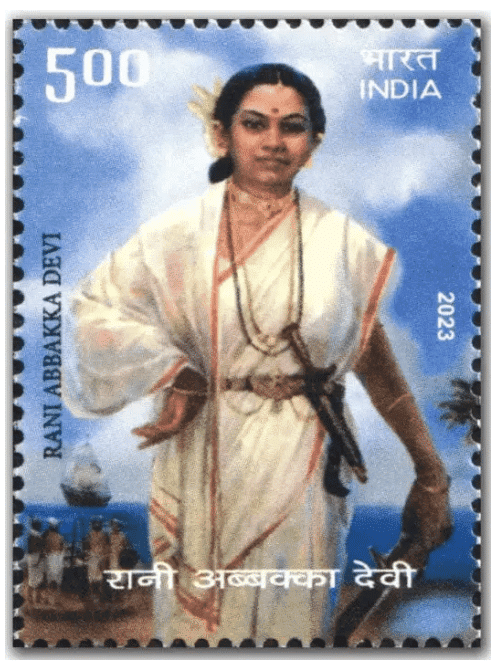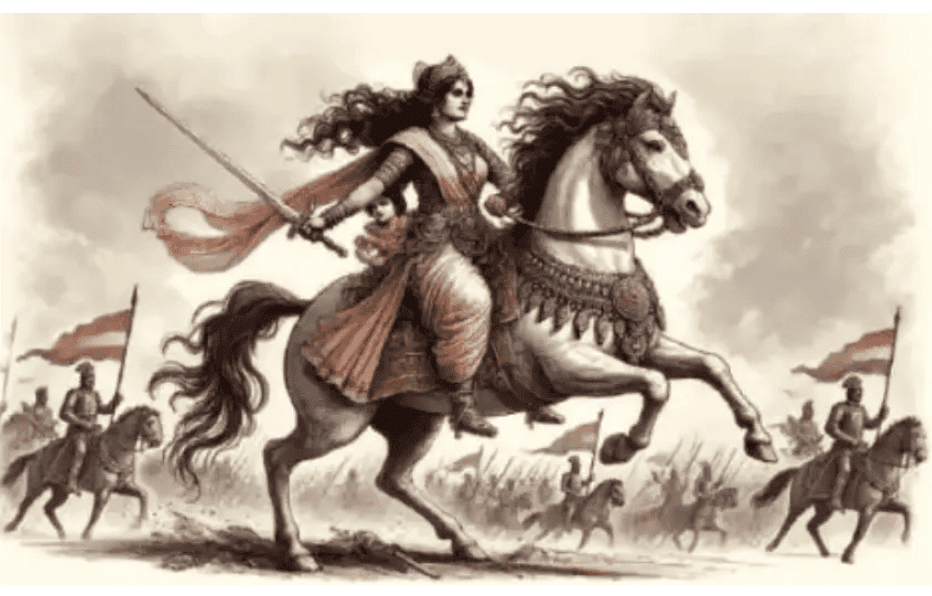Class 7 Exam > Class 7 Notes > English Poorvi Class 7 - New NCERT > Short and Long Answer Questions: Rani Abbakka
Class 7 English Unit 5 Short and Long Answer Questions - Rani Abbakka
Short Answer Questions
Q1: Why did Rani Abbakka refuse to pay tribute to the Portuguese?
Ans: Rani Abbakka refused to pay tribute to the Portuguese because she believed Ullal was a sovereign, independent country that should not be controlled or take orders from Portugal. Her bold stance reflected her commitment to protecting her kingdom’s freedom and dignity.
Q2: What was Veera Narasimha’s reaction to Abbakka’s plan to resist the Portuguese?
Ans: Veera Narasimha, Abbakka’s husband, was worried about her plan to resist the Portuguese, fearing it was rash and could provoke their wrath, endangering his kingdom of Bangadi. He tried to persuade her to change her mind and even ordered his soldiers to stop her, but Abbakka remained resolute.
Q3: How did Rani Abbakka strengthen Ullal against the Portuguese?
Ans: Rani Abbakka strengthened Ullal by ordering the construction of merchant ships, forming an alliance with the Zamorin of Kozhikode, and uniting local rajas against the Portuguese. These strategic moves boosted Ullal’s economy through trade with Arabia and built a stronger defence against the enemy.

Q4: What happened during the battle for Ullal?
Ans: During the four-day battle for Ullal, Rani Abbakka led her soldiers courageously, fighting alongside them against the Portuguese attack. The people of Ullal showed great bravery, defeating the Portuguese, who were forced to retreat, never troubling Ullal again.
Q5: How did Rani Abbakka’s victory impact other Indian rulers?
Ans: Rani Abbakka’s victory over the powerful Portuguese inspired other Indian rulers to resist foreign powers. Her courage and success demonstrated that with unity and fearless leadership, even strong enemies could be defeated, boosting their confidence to fight for their independence.
Long Answer Questions
Q1: How did Rani Abbakka’s determination shape her response to the Portuguese demand for tribute, and what does this reveal about her character?
Ans: Rani Abbakka’s story is a powerful example of how determination and courage can lead to victory, even in the face of overwhelming odds. By refusing to pay tribute to the Portuguese, Abbakka showed her unwavering commitment to her kingdom’s sovereignty, despite facing threats and opposition. Her leadership in uniting local rajas and forming a strategic alliance with the Zamorin of Kozhikode, combined with her hands-on approach in leading her forces, demonstrates her deep dedication to her people and her land. Her actions during the four-day battle and subsequent attack on the Portuguese fort showcased her fearless spirit, ensuring Ullal’s independence and inspiring others to resist foreign domination. This story reinforces the importance of standing up for what is right, no matter the challenges, and the power of unity and resilience in the pursuit of freedom.

Q2: What challenges did Rani Abbakka face in her fight against the Portuguese, and how did she overcome them?
Ans: Rani Abbakka's story is a testament to overcoming challenges through determination and strategic thinking. Despite facing the might of the Portuguese, opposition from her own husband, and doubts from local rajas, Abbakka was able to rally support for her cause. She formed crucial alliances, like the one with the Zamorin of Kozhikode, and improved her kingdom's strength by building merchant ships. Her ability to inspire unity and lead her people in battle, even under intense pressure, highlights her fearless leadership. Ultimately, her victory against the Portuguese showcases how courage, strategic planning, and teamwork can lead to success, teaching readers the importance of resilience when facing obstacles.
Q3: Why was Rani Abbakka’s leadership significant in uniting her people and allies against the Portuguese?
Ans: Rani Abbakka's leadership was pivotal in uniting her people and allies against the Portuguese, showcasing her confidence, strategic vision, and fearlessness. Faced with the challenge of rallying hesitant local rajas, who doubted their ability to stand against the Portuguese, Abbakka's bold declaration of Ullal’s sovereignty inspired hope and determination. She communicated a clear, united front and strategically formed an alliance with the Zamorin of Kozhikode, strengthening both Ullal’s military and economic position. During the intense four-day battle, Abbakka fought alongside her soldiers, setting an example of courage that empowered her people. Her victory over the Portuguese not only secured Ullal’s independence but also motivated other Indian rulers to resist foreign domination. Her leadership reflects the moral of courage and unity, inspiring readers to lead with conviction and unite others to achieve common goals.
Q4: How did Rani Abbakka’s victory over the Portuguese influence Ullal and other Indian kingdoms?
Ans: Rani Abbakka's victory over the Portuguese had a significant impact on Ullal and other Indian kingdoms, reinforcing Ullal's independence and inspiring resistance against foreign rule. By defeating the Portuguese in a fierce four-day battle, Abbakka secured Ullal’s freedom, causing the Portuguese to retreat and never return. Her bold attack on their fort further solidified Ullal’s strength and pride, with her people standing united behind her, motivated by her fearless leadership. The victory also boosted Ullal's economy, as her alliance with the Zamorin of Kozhikode and trade with Arabia thrived, demonstrating the benefits of her strategic defiance. Abbakka's success sent a powerful message to other Indian rulers, showing that even small kingdoms, through unity and determination, could defeat powerful colonial forces. This inspired a wave of resistance, promoting a spirit of independence throughout the region. The story’s moral of standing up for freedom and working together is embodied in Abbakka’s legacy, urging readers to draw strength from her example and fight for justice and unity in their own communities, knowing that strong leadership can create lasting change.
Q5: What lessons about courage and leadership can we learn from Rani Abbakka’s story?
Ans: Rani Abbakka's story offers powerful lessons on courage and leadership, demonstrating that unwavering determination and strategic unity can triumph over even the most formidable adversaries, inspiring others to stand up for what is right. Her courage was evident when she refused to pay tribute to the Portuguese, boldly declaring Ullal’s sovereignty despite threats and opposition from her husband. This showed that sticking to one’s principles requires bravery, even when it involves personal and political risks. Abbakka’s leadership was highlighted by her ability to unite hesitant local rajas, inspire her people, and forge an important alliance with the Zamorin of Kozhikode, showcasing her strategic foresight and persuasive leadership. During the four-day battle, she fought alongside her soldiers and led by example, demonstrating hands-on leadership and resolute determination. Her victory not only secured Ullal’s freedom but also inspired other rulers, emphasising how one leader’s courage can ignite widespread change. The story’s moral encourages us to value independence and collective action, urging readers to emulate Abbakka’s bravery, stand up for justice, and lead with confidence to unite others for a common cause. Her legacy teaches us to face challenges with unwavering courage and to lead with vision, fostering unity and resilience in the pursuit of freedom and dignity.
The document Class 7 English Unit 5 Short and Long Answer Questions - Rani Abbakka is a part of the Class 7 Course English Poorvi Class 7 - New NCERT.
All you need of Class 7 at this link: Class 7
|
55 videos|465 docs|76 tests
|
FAQs on Class 7 English Unit 5 Short and Long Answer Questions - Rani Abbakka
| $1. Who was Rani Abbakka and what is her significance in history? |  |
Ans.Rani Abbakka was a prominent queen of the coastal kingdom of Ullal in Karnataka, India, during the 16th century. She is celebrated for her fierce resistance against Portuguese colonial rule and is regarded as a symbol of bravery and valor. Her leadership and strategies during numerous battles made her a notable figure in Indian history.
| $2. What were the key events in Rani Abbakka's life that showcased her leadership? |  |
Ans.Key events in Rani Abbakka's life include her successful defense of her kingdom against the Portuguese forces, her alliances with neighboring kings, and her innovative strategies in warfare. One of the most notable events was the Battle of Ullal, where she led her troops to victory against a much stronger enemy, demonstrating her courage and military acumen.
| $3. How did Rani Abbakka contribute to the empowerment of women in her time? |  |
Ans.Rani Abbakka's reign is significant for the empowerment of women as she broke traditional gender roles by taking on leadership in battles and governance. Her example inspired many women in her kingdom and beyond, encouraging them to assert their rights and roles in society, paving the way for future generations of female leaders.
| $4. What challenges did Rani Abbakka face during her rule? |  |
Ans.Rani Abbakka faced numerous challenges during her rule, including constant threats from the Portuguese who sought to control the coastal trade routes. Additionally, she dealt with internal dissent and the complexities of forming alliances with other kingdoms. Despite these challenges, her resilience and strategic skills helped her maintain her kingdom's independence for many years.
| $5. Why is Rani Abbakka considered a national hero in India? |  |
Ans.Rani Abbakka is considered a national hero in India due to her unwavering resistance against colonialism and her role in the struggle for independence. Her bravery and dedication to her kingdom have made her a symbol of pride and inspiration, representing the fight for freedom and the empowerment of women in Indian history.
Related Searches





















